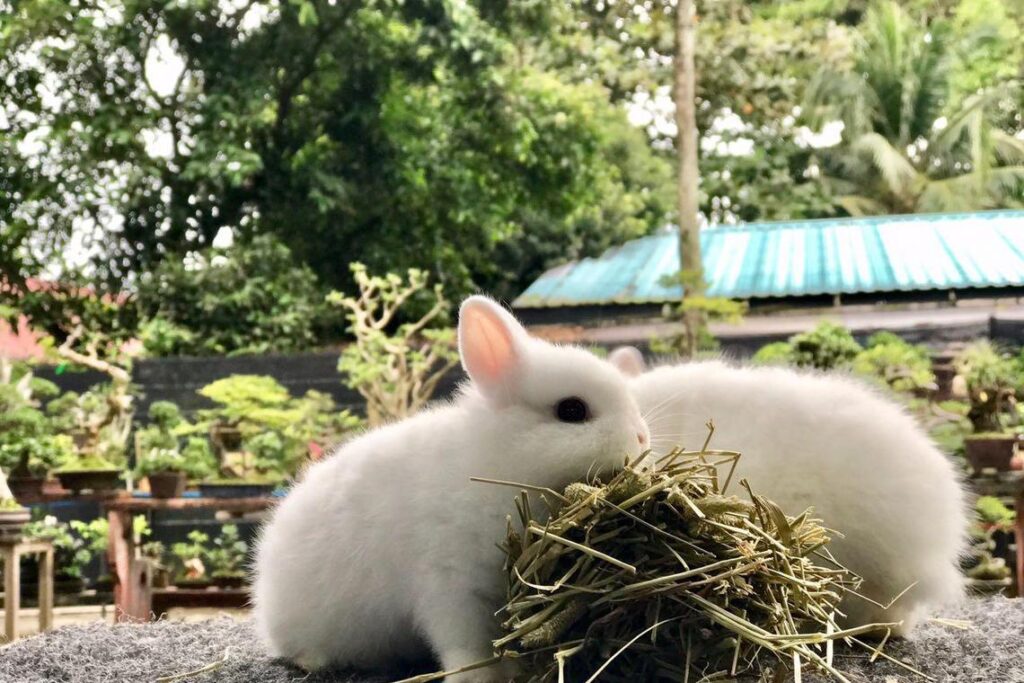Rabbits Need Companionship—Don’t Adopt One Out of Loneliness
Rabbits are social animals; they require companionship and space for activity to stay healthy. Their digestive systems are fragile—if a rabbit stops eating or drinking for more than 12 hours, seek emergency veterinary care immediately to prevent life-threatening intestinal blockage. In addition to unlimited hay and fresh water, rabbits need space for free movement; avoid keeping them in cages for long periods.
Many adults and children want to adopt rabbits because of their cute, fluffy appearance. However, rabbits are 100% herbivores with a lifespan of 8–10 years—some can even live to 12 years or longer with proper care.
Key Health Considerations
Rabbits are adorable but require careful care. If your rabbit stops eating or drinking for over 12 hours, get it to a vet right away—gastrointestinal stasis (GI stasis) is fatal for rabbits. This condition occurs when a rabbit’s intestinal motility slows or stops, causing food to stagnate and accumulate in the digestive tract, leading to a chain of health issues.
- Can rabbits live alone? Rabbits are naturally social and prefer the company of other rabbits. However, a single rabbit can still form a strong, happy bond with humans if its owner spends enough time interacting and accompanying it.
- Common misconception: Many people think rabbits are low-maintenance or “self-sufficient” pets. In reality, they need consistent time and care from their owners to thrive.
Coexisting with Cats/Dogs
If you already have cats or dogs, is a rabbit a good addition? As advised by experts, each pet’s temperament must be evaluated individually. Rabbits can sometimes coexist peacefully with calm, non-predatory cats or dogs—but they need a safe retreat space to escape to if scared.
Signs of Stress or Illness in Rabbits
- When stressed or unwell, rabbits may hide, tremble, or huddle tightly in corners. They may also stop eating or become withdrawn.
- If in pain, rabbits may grind their teeth, change their posture, or show reduced energy levels.
Parasites & Emergency Symptoms
The most common parasite in rabbits is E. cuniculi (Encephalitozoon cuniculi). This parasite usually lies dormant but can cause neurological or kidney problems if activated. External parasites like ear mites and fur mites are also common—seek veterinary treatment promptly if detected.
Emergency warning signs (act immediately if you notice these):
- Loss of appetite
- Lethargy
- Significant reduction or absence of feces
Rabbit Diet: What to Feed (and Avoid)
A pet rabbit’s diet should consist of 80% hay—preferably second-cut hay with firm stems, as this helps maintain dental health. The remaining 20% includes high-quality nutrient pellets and supplements.
- Recommended vegetables: Leafy greens like romaine lettuce, parsley, and Chinese cabbage (these provide hydration, fiber, and nutrients).
- Fruits: Wild rabbits do not actively seek out fruit. Due to their high sugar content, fruits should only be given to pet rabbits occasionally as treats.
- Toxic foods to avoid: Onions, garlic, iceberg lettuce, avocados, processed foods, starchy foods, and human snacks.
Water Intake
Rabbits need 50–150 milliliters of water per kilogram of body weight daily. Always provide clean, fresh water—this is especially critical in hot climates to prevent dehydration.
Housing & Care Supplies
Essential supplies include a litter box, hay rack, food bowl, and water dispenser. If space allows, add a hiding spot for your rabbit to feel secure. In hot weather, placing a cooling mat in their living area is an effective way to help them stay cool.
- Clean the litter box every 2–3 days.
- Tidy their enclosure daily to maintain hygiene.
Preventing GI Stasis
GI stasis is the biggest concern for rabbit owners—it is life-threatening. It typically occurs due to stress, dehydration, or improper diet. Prevention steps include:
- Providing unlimited hay
- Ensuring constant access to fresh water
- Minimizing stress triggers
- Encouraging daily exercise and free movement
Popular Rabbit Breeds
- Netherland Dwarf and Holland Lop: The most popular breeds, loved for their small size and charming personalities.
- Other common imported breeds: Mini Rex, Lionhead, Jersey Wooly, American Fuzzy Lop, Flemish Giant (world’s largest rabbit breed), French Lop, Dwarf Hotot, Dutch, and English Angora.
The Flemish Giant holds records—according to Guinness World Records, the heaviest Flemish Giant ever was a rabbit named Darius, weighing 22.2 kg (49 lbs) and measuring over four feet long.
Quick Rabbit Care Tips
- Provide unlimited hay and clean water at all times.
- Spay/neuter your rabbit to prevent hormone-related aggression and health issues.
- Socialize your rabbit regularly and let it exercise freely.
- Use rabbit-safe paper-based litter for their toilet area.
- Avoid keeping rabbits in cages for extended periods.
- Schedule regular veterinary check-ups.
- Never bathe a rabbit—stress from bathing can cause shock.
- Do not feed iceberg lettuce, avocados, or human snacks.
- If your rabbit stops eating or defecating, consult a vet immediately.

